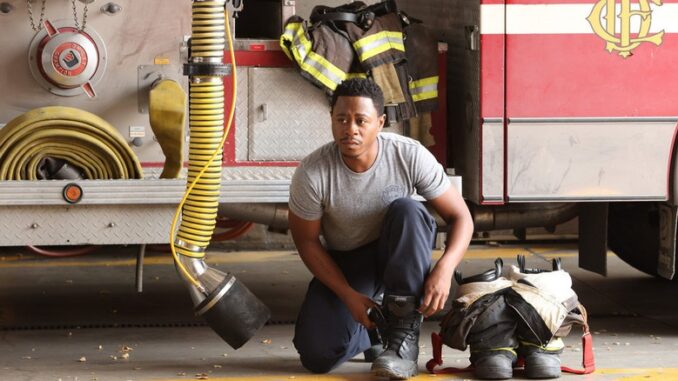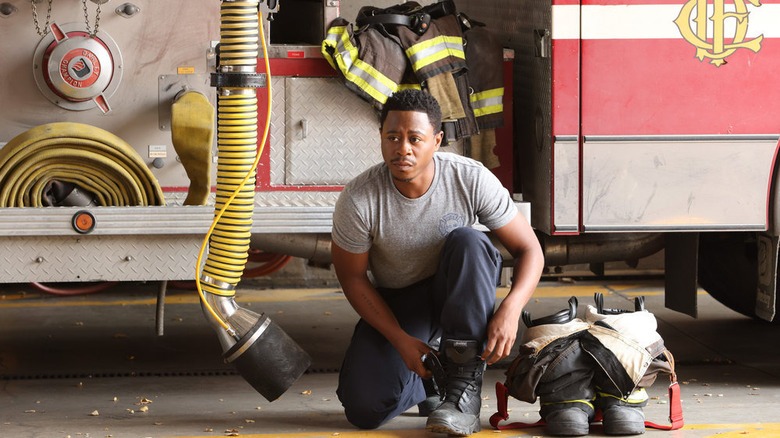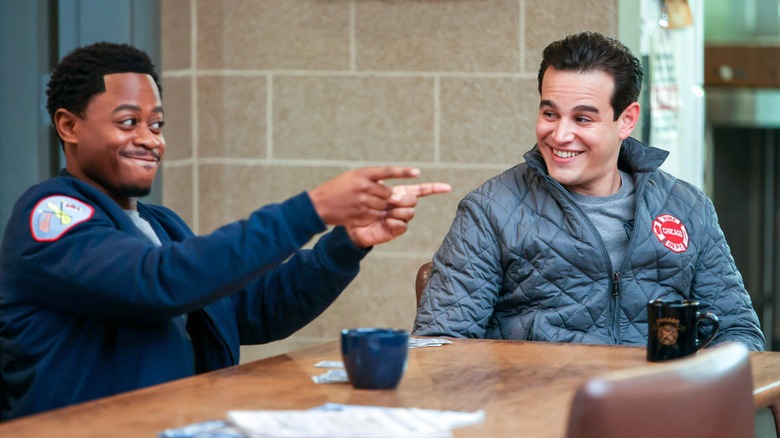
Daniel Kyri has made quite an impact on “Chicago Fire” since joining the cast in 2018 during Season 7. As an openly queer Black man — both on screen and off — Kyri has subtly helped move the needle toward a more inclusive TV world, one where viewers from all walks of life can see themselves represented onscreen at the fictional Firehouse 51. Beyond that, the young actor has helped breathe life into firefighter Darren Ritter, who brings dry humor, heart, and intuitive insight to the hit show, which returns to NBC tonight after a winter hiatus.
A relative newcomer to the acting world, Kyri can often be seen on “Chicago Fire” hanging with fellow young guns Alberto Rosende and Hanako Greensmith, who portray Blake Gallo and Violet Mikami, respectively. The gang of three repeatedly bring comic relief and youthful spirit to the show that follows the personal lives and professional perils of first responders in the Windy City.
It’s a role that Kyri seems tailor-made to play, and one he was more than eager to talk about during an exclusive interview with Looper, where he dished on working with Taylor Kinney, reflected on the departure of longtime star Jesse Spencer, and gave some insight into what it’s like walking in Ritter’s shoes.
Daniel Kyri thinks Ritter wears ‘his heart on his sleeve’
You have quickly become one of my favorite characters in the One Chicago franchise, possibly the favorite. Ritter’s just so likable and dryly funny, always on point … What makes him fun to play, and what’s challenging about the role?

Wow, thank you … It’s kind of like the double-edged sword of Ritter. It’s what I both love about him and also what represents the most challenge. I tend to say this often, but that’s because it’s true. Ritter is the kind of guy whose heart is on his sleeve and there is a sense of presence and vulnerability to the way in which he carries himself. Whether it’s on the job, in the action, you see moments of him interacting with some of the victims on the show or some of the folks that they’re rescuing and there’s always a sense of humanity and connection for him. Even in the midst of the bigger job, which is “got to put the fire out, got to save the people, got to do all the things,” he always has that moment of connection. That is because he’s such a heart-on-the-sleeve kind of guy.
There’s a challenge in that for me because, given what they do, given what firefighters see day in and day out when there are these rescues, it can get a bit difficult to protect self, or to even distinguish self from the job. That’s a tight rope that Ritter has to walk. I really enjoy being able to play both sides of that.
Let’s talk about the humor. It may not necessarily be a defense mechanism for the character, but that sort of dry humor is a way for him to cope with the harder, more difficult parts of the job. I enjoy playing with that too. He is a totally aspirational character because I wish I was more like him in my real life. [Laughs.]
Life imitating art in Chicago
In real life, you’re from Chicago and identify as queer. Do those two things make your role easier to slip in and out of, and how do your real-life experiences influence you or your character on set?

Yes and no. I think the easier part of it is the Chicago part of it all. There isn’t a whole lot of extra coating that I have to put on the dialogue or anything like that because being from here, you get it. You get what neighborhoods that the incidents may be in. That gives me a lot of information being from here already, the makeup of the neighborhoods and the local cultural elements that sometimes do end up being featured. I know. That part is easy, but the ways in which I carry or embody my own queerness and that part of my identity is different than Ritter does. Slightly, but they do differ.
We go hand in hand. There’s a Venn diagram, if you can imagine, and on one side there’s me, the other side is the character and all the things that I’m still discovering about him, and in the middle is where we overlap. Even though there are certain markers for sure, the ways in which we carry and/or present ourselves in real life are totally different. My castmates will definitely tell you, “Oh, no, Daniel’s like…” I’m a little more flamboyant. I’m a little more colorful in my real life. People who follow me on social media also might understand that’s the truth, whereas I think Ritter tends to be a little bit more grounded.
I’ve been doing this job since 2018, so there’s this second skin that you can slip on with the character sometimes, depending on the situation. That does make it a little bit easier to step into his shoes.